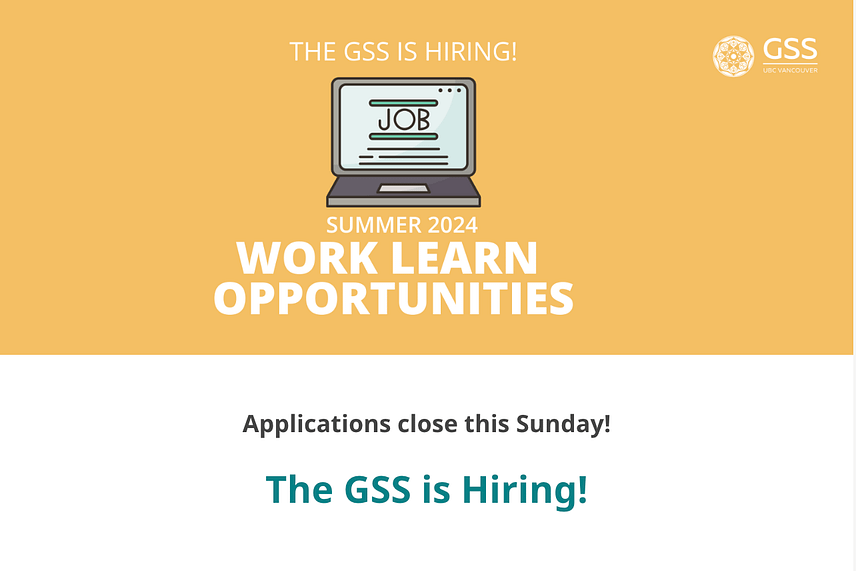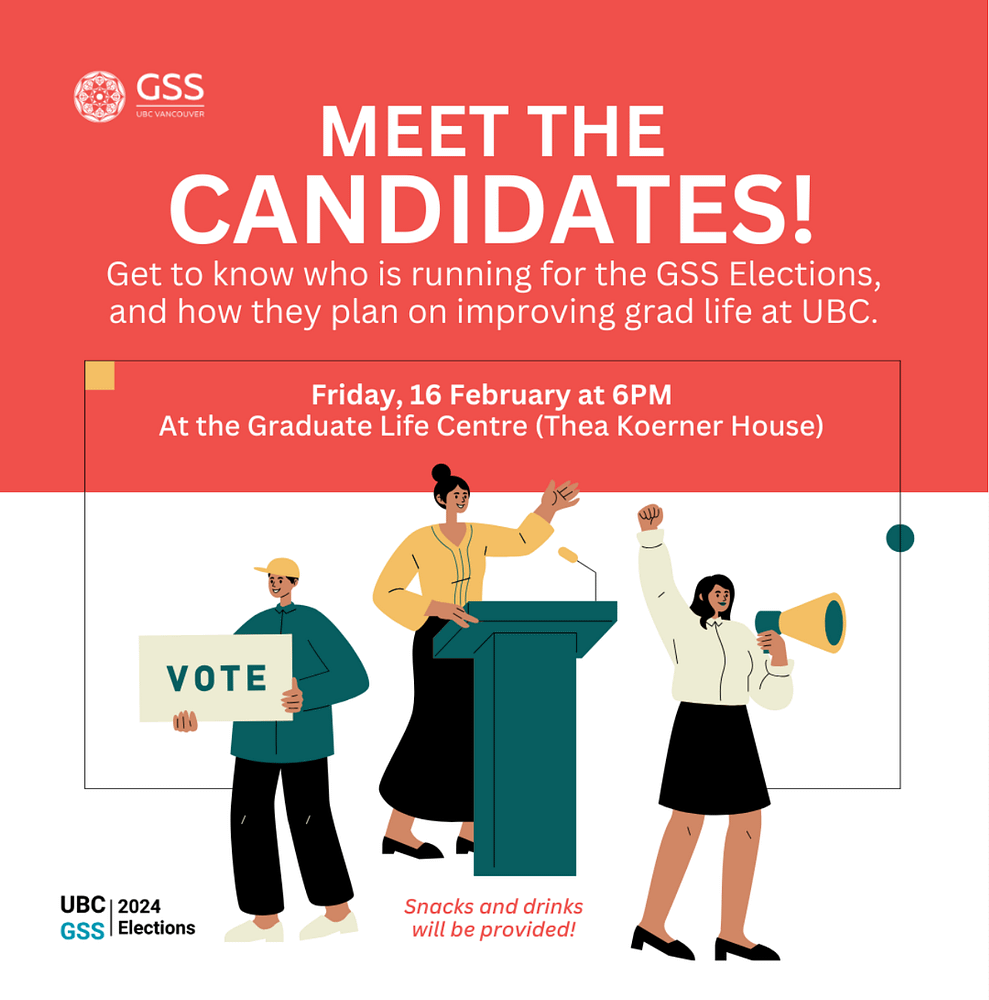[vc_row][vc_column][vc_row_inner css=”.vc_custom_1602611815690{margin-bottom: 20px !important;border-bottom-width: 20px !important;padding-top: 20px !important;}”][vc_column_inner][ultimate_heading main_heading=”Government policies must take into account key differences between undergraduate and graduate education” heading_tag=”h4″ alignment=”left” margin_design_tab_text=”” main_heading_margin=”margin-bottom:20px;”][/ultimate_heading][dt_fancy_separator][/vc_column_inner][/vc_row_inner][vc_row_inner css=”.vc_custom_1602612115662{border-bottom-width: 20px !important;}”][vc_column_inner width=”1/2″][vc_column_text][Vancouver, BC – October 13, 2020]
[/vc_column_text][/vc_column_inner][vc_column_inner width=”1/2″][vc_column_text][/vc_column_text][/vc_column_inner][/vc_row_inner][vc_column_text]Graduate Student Societies of British Columbia, representing over 18,000 graduate students from across the province, is today calling on all political parties in BC to commit to a program of improved and more consistent support for graduate students.
Despite the significant negative impacts that the pandemic has had on graduate programs and research in BC, graduate students have been left with little support by the province. Students are now calling on the political parties of BC to recognize that graduate students are distinct from undergraduates in key ways and require support that takes these differences into account. It is clear that the differing needs and supports important to graduate students have not been historically well-recognized by provincial education policymakers, and while this is an old problem, during the ongoing pandemic it has had the consequence of leaving large numbers of graduate students in a vulnerable financial position.
The Graduate Student Societies of British Columbia urge the parties vying to form the next government to adopt three policies that will help graduate students deliver innovative research that benefits the entire Province:
1) Expand the B.C. Graduate Scholarship and make it a permanently funded program.
The BCGS program, introduced by the BC government in 2018, has provided merit-based funding to hundreds of graduate students across the province, enabling them to continue their research programs with financial peace of mind. However, unless extended, the fund is set to expire in 2021. We would like to see the program become a permanent feature of the graduate education landscape and have it expanded to include students in non-STEM disciplines.
2) Widen the eligibility criteria of the BC Access Grant to include graduate students.
Given their extended years of education and the increasing cost of tuition, the burden of student debt on graduate students is significantly higher than undergraduates1. Despite this fact, there are no needs-based grants for graduate education in BC even though a program exists for undergraduates. Allowing graduate students to apply for funding under the newly created BC Access Grant would, as the name suggests, improve access to education for those struggling with financial barriers to graduate studies.
3) Recognize, and take into account through policymaking, the distinct needs of graduate students and the critical role they play in promoting the social and economic development in the province.
The educational context in graduate programs is vastly different from those found
in undergraduate programs. Political parties in BC need to recognize that a one-size-fits-all approach to supporting post-secondary education is not optimal, and that support for graduate programs needs to take into account the distinct characteristics of graduate students, from financing to motivation to demographics. In particular, graduate programs are research intensive, enroll a large proportion of international students (with top international talent recruited to BC from around the world), and have many participants with new families and young children. It is also important to apply these insights to a broader range of government policies in order to better serve graduate students during their period of study.
Here is what graduate student leaders across BC have to say about these proposed policy changes:
“Graduate students create vast society-wide benefits with their research often leading to the creation of new technologies, new businesses and new ways of understanding our society, and they pass that new knowledge on as teachers in many programs. Introducing these changes would demonstrate that the Province appreciates the value of the contributions graduate students make and would be an investment in BC’s knowledge economy.” – Alireza Kamyabi, University of British Columbia Graduate Student Society
“These are reasonable and eminently achievable policy goals that will provide increased financial security and predictability to graduate students across the province without giving headaches to those drawing up government budgets in Victoria.
We’re often overlooked in conversations about post-secondary education, but graduate students give up years of employment income and other opportunities in order to develop their research skills and keep BC at the forefront of the new knowledge-based economy, often juggling full time study with family responsibilities. These changes would put them on a more secure financial footing and allow them to focus less on debt and bills, more on their research and teaching.” – Matt McDonald, The Graduate Student Society at Simon Fraser University
“Graduate students contribute so much to their universities and to the development of their society, in general – We are teachers, researchers, our work is published and can achieve academic clout for their institutions to boost their popularity—We can discover new methods scientifically, politically, or otherwise that can contribute to how policy is formed and what technological advances are made… It is very important that Graduate Students’ vote for a leader who will recognize our uniqueness in contributions as well as needs.” – Abby Dooks, Northern British Columbia Graduate Student Society
“Graduate students are much more likely to have families of their own relative to
undergraduate students. The need to support families is already a significant barrier to
graduate education and the COVID-19 pandemic has intensified this. Improving the
accessibility and affordability of childcare is one very easy and effective way to support
graduate students, however, the unique labour market situation of graduate students must also be a consideration in the on-going pandemic relief efforts.” – Drake T. Rushford, University of Victoria Graduate Students’ Society
About Graduate Student Societies of British Columbia
Graduate Student Societies of British Columbia is composed of the University of British
Columbia Graduate Student Society, the Graduate Student Society at Simon Fraser University, the University of Victoria Graduate Students’ Society and the Northern British Columbia Graduate Student Society, together representing over 18,000 students in BC. These four organizations are registered under the BC Societies Act and are tasked with providing services to, and advocating on behalf of, the graduate students attending their respective institutions.[/vc_column_text][/vc_column][vc_column][/vc_column][/vc_row]





